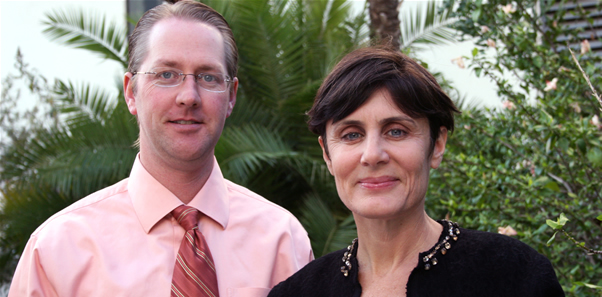Education Professors Launch Pilot Project
Grant Funds Online Program to Spark Interest in Science Among Fifth-Graders
January 7, 2008
Debra Cano Ramos
Mark Ellis and Maria Grant of secondary education are set to launch a new technology-based program to support fifth grade English- language learners in their study of science.
“Helping with English Language Proficiency through Science (HELP Science)” is an online, supplemental instructional program that focuses on increasing science achievement in fifth grade students, as well as sparking interest in the subject, Ellis said.
The pilot program is funded through a $50,000 Motorola Foundation Innovation Generation grant. Motorola awarded the grants in 2007 to inspire youth, particularly girls and underserved minorities, to embrace science and math at an early age.
To ensure that the final product meets state science content standards, as well as the needs of elementary school teachers and their students, the two assistant professors of secondary education plan to work with a focus group of teachers to determine the best way to present the integrated package of technology and hands-on science.
Because the specific intent of the program is to serve students who are English-language learners, Ellis and Grant plan to develop the modules and pilot the program at an Orange County elementary school with a significant population of non-native English speakers.
One of the major causes of students failing academic subjects such as science is due to language barriers, according to Ellis, who is coordinator of the university's Foundational Level Mathematics program (http://campusapps.fullerton.edu/news/inside/2007/middle_school.html).
“If a student cannot understand what is being said in science class, then it is difficult to move beyond the language to master science content and skills — no matter how gifted the student may actually be,” he noted.
Grant, a former middle and high school science teacher, added that learning the language of science is in itself difficult.
“For a student, the demands of learning science terminology coupled with a limited understanding of English can impede both the progress and the enjoyment of exploring science,” she said.
With HELP Science, students will learn through research-based, multimedia lessons that break down scientific terms and concepts, thereby reducing language barriers so students can more readily learn, understand and retain the content, Grant said.
Due to the rising number of English-language learners in schools throughout the state and country, teachers and schools must learn to better support language development and content learning, Ellis said.
“Having added resources — such as HELP Science — for this effort will be much appreciated as educators work to meet the needs of all students and help them to achieve academic proficiency,” he said.
To bring the latest research-based methods into teachers’ classrooms, Ellis and Grant will collaborate with Digital Directions International, a Colorado-based educational technology company, part owned by Rocky Mountain PBS, that has successfully launched HELP Math, available nationally through Discovery Education.
Ellis explained that the concept of using technology to develop instructional techniques for subject areas was first applied by Digital Directions in the HELP Math program, made possible through U.S. Department of Education funding and now supported by other grants and private contributions. That program has been successful in raising student achievement in math and also will be made available to students participating in HELP Science, Ellis said.
Grant added that many elementary school teachers do not have backgrounds in teaching science, resulting in a need for supplemental instructional programs, such as HELP Science, to assist them.
“It’s going to fill a need that is out there — and one that will grow, and not just at the state level, but nationally as well. This will especially help teachers without a science background,” Grant said.
Ultimately, their goal is to develop a program that would help students in grades K-8 in schools across the country, said Ellis, adding that they will seek additional funding to further develop the HELP Science project.


